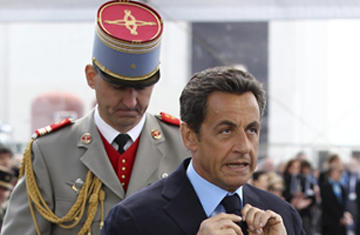
French President Nicolas Sarkozy adjusts his tie before the inauguration of the French frigate Aquitaine in Lorient
During his three years in office, French leader Nicolas Sarkozy has been hailed by supporters and decried by opponents as a ubiquitous "hyper-President": a man who insists on calling all the shots, and with the highest profile possible. Given that reputation, it's not surprising that many French voters are starting to wonder where Sarkozy has disappeared to in the past few weeks. The recent volcanic-ash travel chaos and the ongoing Greek-economy crisis are two no-brainer spotlight-grabbing opportunities, but the French President is nowhere to be seen. Why is a leader once championed — and criticized — for bringing bling-bling to the Elysée now passing on his moment to shine?
The French may not be the only ones perplexed by Sarkozy's vanishing act. In late 2008, as the financial crisis was unfolding, he took a leading role in bringing European Union leaders together to come up with a collective response; now, during Europe's sluggish reaction to the Greek-debt emergency, Sarkozy has stayed almost invisible, letting German Chancellor Angela Merkel take center stage. He also let air-safety and government officials make all the decisions after the cloud of volcanic ash from Iceland invaded European skies. And while U.K. politicians have been hunkering down at home ahead of general elections — and U.S. President Barack Obama remains focused on domestic challenges — Sarkozy has failed to return to the unoccupied diplomatic spotlight by again prodding partners to take a tougher stand against Iran, come up with some form of financial-market regulation and agree on firm targets and dates to reduce greenhouse-gas emissions.
Instead, Sarkozy has been quietly carrying out the understated duties of the classic French presidency. On Tuesday, they took him to the Breton port city of Lorient, where he unveiled a new generation of frigates that France will produce for its navy — and hopes to sell to European partners. That outing followed a four-day visit to China last week, notable for the absence of discussion on topics like human rights and the treatment of Tibet (the same topics that prompted a long, painful series of retaliations by Beijing when Sarkozy previously raised them). Between those two engagements, Sarkozy attended a French soccer cup final, huddled with Cabinet members to discuss Europe's bailout plan for Greece and met with farmers who were happy to hear him promise to "do everything to protect French agriculture."
It all seems like sleepwalking from a leader who is famous for browbeating domestic opponents and lecturing foreign leaders who are slow to adopt his position on sensitive international topics, and who is ever ready to wade into crises like the Russian-Georgian military conflict in the summer of 2008. What has changed? Sarkozy's popularity, for starters, as well as the French people's deference to his leadership.
The President's downshifting to a more demure style came in the wake of regional elections in March that saw his ruling conservative troops pummeled by leftist rivals. A major reason for that drubbing, many analysts say, was a boycott by rightist voters who were angry at what they saw as the ideological inconsistencies of Sarkozy's pragmatic policymaking.
Meanwhile, public opinion is increasingly punishing Sarkozy for something his early popularity was built on: his can-do philosophy that says results are the only thing that matter — and the only thing he'll except from his government and the nation. A large part of Sarkozy's record-low approval rating of 32% in April, experts say, is the public's frustration at seeing so few results after three loud years of reformist rhetoric
"Previously people were willing to give Sarkozy time to produce what he promised, but three years into a five-year term, patience has run out," says Jean-Marc Lech, co-president of the Ipsos polling agency. "Before, Sarkozy's energy, enthusiasm and flair meant he could basically define the market of public opinion himself. Now that market has taken control back, and it isn't buying what he's selling."
Neither are many legislators in Sarkozy's ruling conservative party, who are insisting that the President redelegate policy management to his government and stop treating Parliament like his personal rubber stamp. Perhaps in response, the President has allowed his Cabinet to take the lead on the controversial pension reform that is now being debated and pilot a law to ban the wearing of full Islamic veils in public. Sarkozy has also assumed the traditional presidential distance from the everyday management of the state. Now he seems to be focusing on international issues and otherwise keeping out of the limelight.
But will it last? Lech notes that it's not the first time Sarkozy has toned his act down — and says it's never for long: "Sarkozy is always vulnerable to his ego and impatience overpowering him." Lech also stresses that French presidential elections are won and lost not on international affairs but on the state of France's economy. Meaning that Sarkozy must find a way to restore the flush to France's sickly economy — and be able to boast primary responsibility for it — if he hopes to win re-election in 2012. His days of reserve and modesty are probably numbered.
